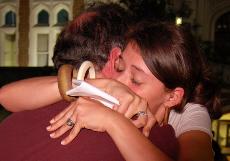“You have a voice! Decide to end sexual violence,” was the mantra for the 15th annual Take Back the Night march against sexual violence held at Loyola and Tulane Universities last Wednesday.
Ceremonies began in the Horseshoe, where drama and mass communication senior Amanda Credeur reiterated the purpose of the march.
“This is a night of symbols,” she said, referring to the continuous ringing of a musical triangle. “Every 15 seconds the triangle rings to remind us that every 15 seconds a woman is raped in the U.S. In the two hours we meet tonight, 480 women will be attacked.”
The featured speaker of the evening was a Loyola senior, who shared the story of her rape freshman year. The speaker was raped by a classmate after losing consciousness at a Tulane fraternity party.
She spoke of the pain of her experience and the subsequent pain that came from three years of failed legal proceedings in hopes of prosecuting her aggressor. She said she is on her way to healing from the “nuclear bomb rape drops on a person’s life.”
Susanne Dietzel, director of Loyola’s Women’s Resource Center, spoke about violence against women as a persistent problem. She said that sexual violence is deeply woven into our “patriarchal society.”
Dietzel shared powerful statistics, relaying that one in three American women have the potential to be victims of sexual violence, with increased odds against college women. She went on to say that she believes that an inferior view of women is a major source of this violence.
“Only in a world of equality can we teach non violence and respect,” Dietzel said. “Together we need to break the silence that makes us complicit. Women need to walk the dark streets as equals. Only then can the night be ours, too.”
Following the speeches, those in attendance were given white candles and asked to march down St. Charles Avenue to Broadway Street then from Broadway to Zimple Street and into Tulane’s Rogers Chapel.
Varying in age, race and sexual orientation, the many participants marched as a unified body, joining in chants of, “2-4-6-8, no more violence, no more rape,” and “Hey-hey, ho-ho, sexual assault has got to go.”
The altar in the chapel was dimly lit by a single candle and completely bare except for a microphone. Survivors of rape shared their experiences with sexual assault in an open-microphone fashion. These accounts, as diverse as the students who told them, highlighted the many different faces of sexual assault. Many of the speakers offered lessons to the audience.
The final person to approach the altar was a middle-aged woman with a thick Jamaican accent. She made it clear that she was not a victim, but that she was moved to speak by the courage displayed by the young people who had shared their stories.
She expressed pride in them and spoke about the importance of self-love.
Engaging the audience in a sing-along she teaches to her Sunday school children, she led the crowd with: “There is love. There is peace. Wherever there is love, you will find peace.”
Each person in attendance then voiced his or her personal commitment, “I, (insert name), take back the night!”
Katie Anderson can be reached at keanders@loyno.edu.






